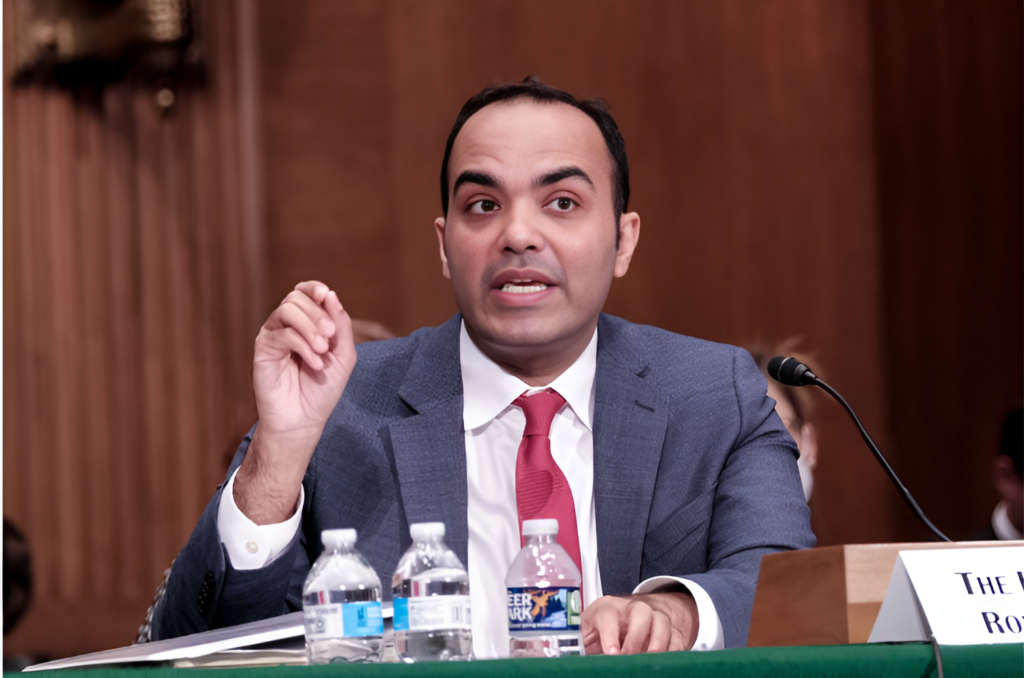
Rohit Chopra, director of the Consumer Financial Protection Bureau (CFPB), is not someone you’d expect to receive accolades from Republicans. As the head of the consumer finance watchdog since his confirmation three years ago on a party-line vote, Chopra has made waves by targeting banks and tech giants. His efforts, often highlighted by the White House, aim to demonstrate support for everyday Americans. GOP lawmakers, however, frequently criticize him as overly partisan.
Yet, in a surprising turn, Chopra earned praise this week from an unlikely source: Republican Patrick McHenry, chair of the House Financial Services Committee. The reason? Chopra finalized rules granting consumers more control over their financial data, prompting McHenry to call the move “a promising step forward to protect Americans’ financial data privacy.”
Though the announcement comes just weeks before a high-stakes presidential election, it’s unlikely to dominate headlines in Washington’s current frenzied political climate. Still, the regulation could be one of Chopra’s most enduring legacies, with implications that might outlast a partisan shift in the White House.
The CFPB’s new data-sharing rules mark a strategic shift for the agency. Long a target of Republican ire since its creation, the bureau has adopted a path familiar in Washington: crafting rules that garner support from some private sector players.
The regulation mandates that banks transfer financial data to other companies at a consumer’s request, while restricting those firms from repurposing the data for other uses, such as targeted advertising. By imposing these guardrails, Chopra aims to improve the financial system’s transparency and competitiveness. The move could disrupt the dominance of big banks by empowering smaller, tech-driven competitors—an idea that resonates with conservatives who champion free-market principles.
Chopra emphasized that the rule is rooted in fostering competition. “Very few large incumbents want to face more competition,” he said in an interview. “But that’s exactly what Congress wanted—more competition rather than less.”
The legal foundation for this rule dates back to the CFPB’s inception, the brainchild of Sen. Elizabeth Warren (D-Mass.). In recent years, however, the urgency for formalized data-sharing rules has grown as banks and financial tech companies have clashed over access to consumer information.
Currently, financial apps access consumer data through two primary methods:
- Screen scraping: Apps extract data directly from a user’s bank account after they log in, giving the app broad visibility into their financial history.
- APIs: Consumers are redirected to their bank’s website, where they authorize specific data fields to be shared with the app.
While APIs are seen as the industry gold standard, their implementation requires complex negotiations, with banks often reluctant to share more data than necessary. Screen scraping, meanwhile, can leave consumers exposed, granting apps excessive access for longer than intended.
The new CFPB rules aim to streamline and standardize these processes, empowering consumers to “vote with their feet” by switching banks or financial services providers more easily. Chopra also highlighted potential benefits for underbanked populations, who could use cash-flow data to secure loans without relying on traditional credit histories.
Chopra’s regulation taps into themes that appeal across the political spectrum: protecting consumers, expanding financial inclusion, and enhancing market competition. Under the rules, companies accessing a consumer’s data must obtain annual reauthorization and allow consumers to revoke access at any time.
Supporters hope the CFPB’s efforts could serve as a blueprint for broader data privacy reforms, an issue Congress has long debated but failed to resolve comprehensively. “The guardrails established here are very good and could model solutions for other privacy issues,” said Chi Chi Wu, a senior attorney at the National Consumer Law Center.
However, banks argue the rules could increase fraud and leave them vulnerable. Critics warn that by requiring banks to transfer sensitive data to third parties with minimal oversight, the rules compromise security. “This rule handcuffs banks’ ability to demand high security standards from third parties,” said Trish Wexler, a spokesperson for JPMorgan Chase.
The regulation’s future faces significant legal hurdles. On the day the rule was announced, the Bank Policy Institute and Kentucky Bankers Association filed a lawsuit challenging it.
If the rule withstands legal scrutiny—or if elements of it are codified into law—it could fundamentally reshape power dynamics in the financial industry. By giving consumers greater control, the rules force banks, tech firms, and data aggregators to work together when a customer requests it.
“This really doesn’t create a new framework from scratch,” Chopra noted. “It builds on what has already been successful in the marketplace. That’s part of the reason you’re seeing broad support.”
As the CFPB navigates the legal and political landscape, one thing is clear: Chopra’s tenure may be remembered for bridging ideological divides in pursuit of consumer empowerment—however fleeting that consensus might be.





